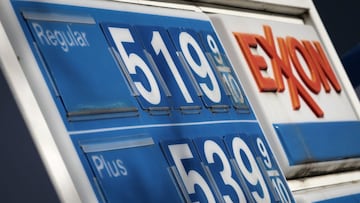Gas stimulus check: is there a chance that the proposal will reach Congress?
With gas prices surging across the country, various proposals have been introduced on Capitol Hill. What do they include and could they become law?


As consumers pay more at the pump and many voters are supportive of the government taking action to reduce costs. Over seventy percent of respondents to a poll conducted by Morning Consult said they would support tax holidays at the federal and state level. This would mean that the governments could reduce gasoline taxes over a period of time to cut costs for consumers.
Other popular measures included asking domestic producers to increase oil production and the release of barrels from strategic reserves. The White House has said that they are supportive of domestic producers increasing their production, but that at this time the federal government will not support them financially to do so.
Out of a list of eight potential options to reduce gasoline prices, American voters are most likely to support temporary breaks from paying federal taxes on gas (73%) and state fuel taxes (72%) to ease soaring gas prices. https://t.co/N4jDyxwnOC pic.twitter.com/tG8OLQGVVu
— Morning Consult (@MorningConsult) March 23, 2022
Additionally, when President Biden announced that the US would prohibit Russian oil and gas imports, he stated that the US and allies would be releasing sixty million barrels of oil from strategic reserves.
Leaders on Capitol Hill have their own ideas and have introduced various proposals that could bring costs down for consumers. Some of the proposals include a 'gas stimulus check' similar to the Economic Impact Payments made by the IRS earlier in the pandemic.
Could a gas stimulus check be sent to households?
Three Congressional representatives, Mike Thompson (D-CA), John Larson (D-CT), and Lauren Underwood (D-IL), have introduced the Gas Rebate Act of 2022 which would send a rebate worth $100 a month, plus $100 for each dependent, to households in the US through the end of the year. The rebate, however, would only be sent to households living in areas where the average price of the gallon is above $4.00.
The bill aims to combat the "Putin Price Hike" which the representatives see as placing enormous strain on the economy and low and middle class families.
“Americans are feeling the impact at the pump of Vladimir Putin’s illegal invasion of Ukraine, and right now we must work together on commonsense policy solutions to ease the financial burden that my constituents are feeling,” said Con. Thompson.
Who would be eligible?
Aside from the gasoline price threshold, there are income requirements to receive the gas rebate.
Who has co-sponsored the bill?
- Nanette Barragán
- Andre Carson
- Steve Cohen
- Jesús “Chuy” Garcia
- Raúl Grijalva
- Pramila Jayapal
- Mondaire Jones
- Marcy Kaptur
- Tom Malinowski
- Chellie Pingree
- Katie Porter
- Deborah Ross
- Mark Takano
- Dina Titus
- Rashida Tlaib
- Lauren Underwood
- Peter Welch.
Those who file their taxes under the status "Single" will be able to receive the benefit if they make less than $75,000 a year. After $80,000 the quantity distributed will begin to decrease.
For those that file jointly, the cut of is $150,000, and after $160,000 the rebate value will be phased out.
What other proposals have been made?
Oregon Congressman Peter DeFazio introduced a bill on 16 March called the Stop Gas Price Gouging Tax and Rebate Act. DeFazio says that this bill would place a tax on windfall profits from oil companies as they are expected to rake in billions in profits as prices sore.
As Ukraine suffers from the brutal invasion from Russia, “Big Oil is foaming at the mouth,” said Rep. DeFazio. The congressional leader finds this behavior unacceptable after gouging many Americans to increase their own profits during the pandemic.
"As we face COVID-related supply chain bottlenecks and uncertainty created by Vladimir Putin’s unprovoked invasion of Ukraine, I repeat to Big Oil what President Biden said just a week ago – it’s no time for profiteering or price-gouging," argued DeFazio.
How would the bill work?
Related stories
The bill would mandate that during 2022 if oil companies have increased their profits 110 percent about their typical annual taxable income, they would have to pay taxes on at least fifty percent of those "windfall profits."
This tax revenue would then be returned to the taxpayers as a rebate.

